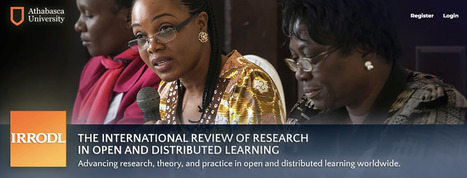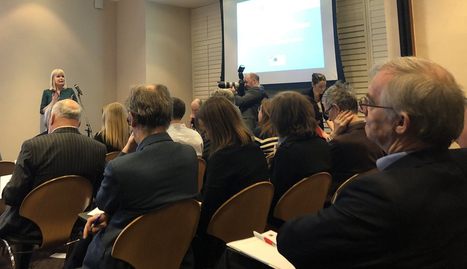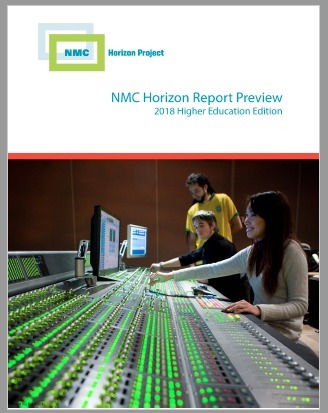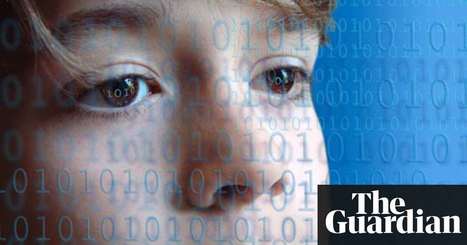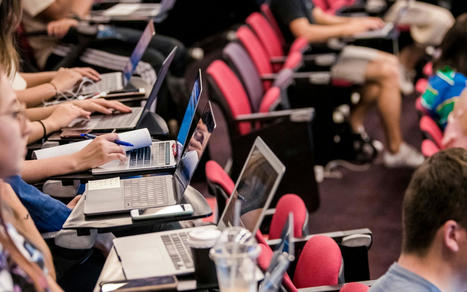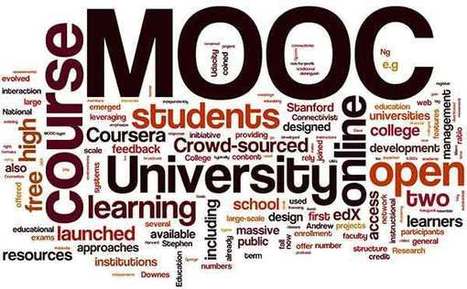 Your new post is loading...
 Your new post is loading...
Instead of seeing edtech as a silver bullet that simply drives learning outcomes, it is more useful to think of it as technology that mediates learning relations and processes: what relationships do we value as important for students and when is technology helpful and unhelpful in establishing those?
Via EDTECH@UTRGV, Elizabeth E Charles
"Research suggests that attackers who disrupted online classes often did so at the invitation and encouragement of students in those same classes -- which instructors need to know if they want to guard against noxious interruptions ..."
Via Leona Ungerer
"A trusted, curated list of the best and most innovative edtech startups that can help you meet your institutional targets ..."
Via Leona Ungerer
"How to move beyond the immediate response to Covid-19 ..."
Via Leona Ungerer
This paper considers the current state of the United Kingdom Open University (UKOU) and the implications for the evolution of higher education, whether through open or traditional institutions. Although 50 years have passed since the establishment of UKOU, the first open university, such institutions seem to be losing their ground, notably because they face challenges in creating a clear identity for themselves. By definition, they have been distinguished from traditional universities by offering both open access and open admission. However, some cases of open access (i.e., distance teaching through the adoption of various technologies) are found in China, South Africa, the USSR, and the US. Even so, the introduction of open admission policies can be considered a core feature of open universities. Such policies have been criticized for creating a so-called revolving door, with students failing almost immediately. To counteract this, UKOU developed a particular quality assurance system, which allowed them to be an authoritative higher education institution. Specifically, they structured regional networks with shared responsibilities, to offer all the elements that make up a university including headquarters, regional offices, and even spaces for students. This form of networked university is what differentiates open universities from the traditional university model and constitutes a unique feature of this type of educational institution.
Via Ana Cristina Pratas, Elizabeth E Charles
By Professor Grainne Conole. I recently attended a HEA Future-focus Forum on Digital Transformation and Empowering Technologies in Higher Education. Prior to the meeting a paper was circulated setting the scene for the meeting. This contextualized the topic by referencing various Irish and EU relevant documents, including the Irish Future Jobs Initiative, the Digital Agenda for Europe, the European Digital Education Action Plan, the European Higher Education Area in 2018, etc. The paper argued that digital transformation is pervasive and can be understood as the changes that digital technology causes or influences in all aspects of human life. In addition, Higher Education will change significantly over the coming years due to digital transformation. Critical questions include: how can higher education Institutions (HEI) provide leadership in ensuring an ethical and responsible use of technology and data? How do we empower people to build a data-first culture and future proof our digital infrastructure? What are the challenges and how do we prepare for them? What international best practice exists to inform a national approach to digital transformation in Higher Education?
Via Elizabeth E Charles
"The blockchain and artificial intelligence are among several technologies and practices poised to impact higher ed, according to experts at Educause ..."
Via Leona Ungerer
Higher education leaders and decision makers use the annual Issues, Technologies, and Trends resources to know what's important and where to focus in their IT planning and management activities. When viewed together the resources provide more complete and nuanced guidance on institutional IT priorities.
The lists are created by the community for the community, with support from EDUCAUSE staff. The Top 10 IT Issues list is developed by a panel of experts comprised of IT and non-IT leaders, CIOs, and faculty members and then voted on by EDUCAUSE members in an annual survey.
The Trend Watch and Strategic Technologies reports are derived from authoritative sources that annually identify emerging and maturing technologies and trends in higher education. The ELI Key Issues in Teaching and Learning list is crowd-sourced by surveying the higher education teaching and learning community to identify the issues and topics most important to them. The NMC Horizon Report identifies and describes emerging technologies likely to have an impact on learning, teaching, and creative inquiry in education.
Via John Evans
"A recent sector scan across Australasian universities conducted by the Australasian Council on Open, Distance and e-Learning (ACODE) found the variable uptake of ePortfolio tools ..."
Via Leona Ungerer
"This analysis of Georgetown’s first six MOOCs (massive open online courses) comprises three parts, moving from general to specific in scope. I begin with a discussion of demographic factors across all six courses, seeking to answer the following question: “Who takes, and succeeds in these courses?” Next, I discuss the relationship between stated intention and course performance with survey data from a pre-course survey for Georgetown’s very first MOOC, an economics course. I end by examining the gender achievement gap in the same economics course. [Healy, P. A. (2017). Undergraduate Economic Review, 14(1)]
First define what you mean by digital literacy: The definition I most frequently use is this one: digital literacy = digital tool knowledge + critical thinking + social engagement. Then it's worth knowing its main characteristics:
Via Elizabeth E Charles
The next big transformative tech surge may well come in the form of virtual reality. But what exactly is virtual reality? Simply put, it’s immersive first person software that transports the user to a whole other space. They can operate within that space as if in reality, but the difference is that space is actually digital. It is different from Augmented Reality (AR), which layers data over our reality to produce a new experience of our actual world. The popular game Pokemon Go is a great example of AR in action.
Via Carlos Fosca
The Online College Students 2017: Comprehensive Data on Demands and Preferences report surveyed 1,500 current, prospective and recently graduated online college students to learn about developing trends in online learning. This sixth annual report reveals how students feel about the value that online learning provides, how mobile technology affects online learning, the most popular fields of study and more.
Via ColinHickie
|
"Treating online education as a cheap alternative to lectures will be a mistake. At first, universities will probably have to allow more preparation time and invest more in training and technology ..."
Via Leona Ungerer
A free course covering key introductory learning and teaching concepts and strategies for those in their first few years of university teaching.
Via Peter Mellow
An open letter, signed by more than 600 academics, is calling on state and federal education ministers to ensure universities change their hierarchical corporate structure.
Via Peter Mellow
"The makers of a variety of tools and platforms are offering generous access to their solutions in a bid to help higher education adjust to its new normal with remote learning ..."
Via Leona Ungerer
Learn how a few strategic moves can help higher-ed IT teams make online courses more streamlined and enjoyable for students and educators.
Via EDTECH@UTRGV, Elizabeth E Charles
"The growing use of voice search and virtual digital assistants will have an increasing impact on how we deliver, search for and market higher education ..." ©
Via Leona Ungerer
"The Online Learning Consortium (OLC), the leading professional organization devoted to advancing the quality of ..."
Via Leona Ungerer
This white paper provides an overview of the growing field of instructional design in higher education, from why the field is growing to how designers are functioning in their role. It explores why there is a growing demand for designers, who is filling these roles, what the responsibilities of designers are, and how instructional designers are addressing the challenges they face.
Via Elizabeth E Charles
This paper focuses on learning practices in higher education in relation to a digital participatory culture. Using key principles of critical education, the research set out to explore higher education students’ sense of agency online – or lack of it –as part of their formal learning practices. The research found that although students were proficient Web users, they did not exercise their learner agency beyond what they assumed to be expected of them, thus evidencing the stability of their learning habits in relation to the learning conventions associated with the academic field. Perhaps more surprisingly, however, is students’ perception of the Web not only as a space of student participation, but also as a space of student surveillance. Such perceptions constitute real obstacles to meaningful participation as a form of learning.
Via ColinHickie
"Supporters of open academic content have long touted its ability to widen the impact and productivity of scholarship while relieving cost pressures in academia. While the development of open access (OA) publishing and Massive Open Online Courses (MOOCs) have been labeled a disruption to publishing and the academic community, this study finds that OA has a more tempered impact on scholarship while the impact of MOOCs on teaching is more severe.Click here to edit the content." [SAGE Open]
We should accept a modest level of attrition so we can keep providing opportunities for part-time and online students, who might not otherwise be able to study.
Via Peter Mellow
"Teaching online is a unique experience for faculty and students. Although I love the online environment for some courses, it does present its own challenges. One of those challenges is how to engage online students in activities that push them to go beyond simply reading, interpreting, and interacting. After all, the idea (in most cases) is that the student can apply their learning, knowledge, and skills in their respective fields of study. As such, we are constantly seeking ways to engage students in learning that goes beyond the “click-through” material.
In this article, I share a few ideas—starting with the simplest and working through some more complicated endeavors—that may assist you in bringing more engagement to your online classroom." (By: Eric J. Perry, PhD).
Via Carlos Fosca
|



 Your new post is loading...
Your new post is loading...






